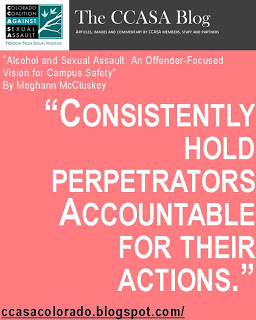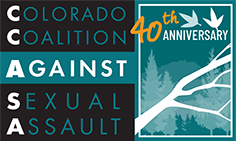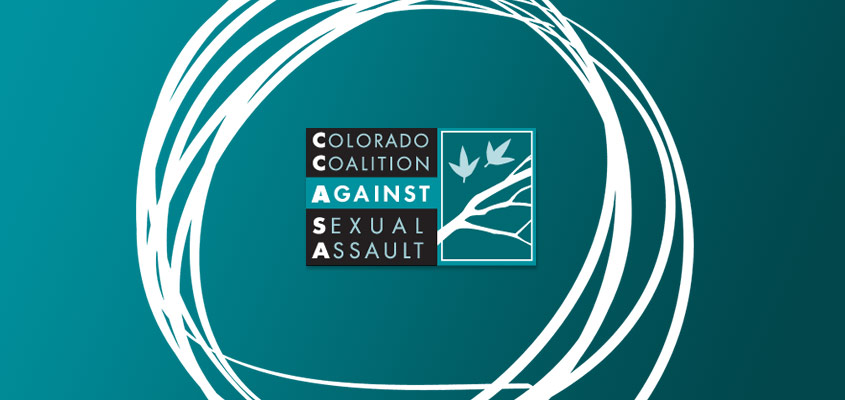By Meghann McCluskey, CCASA Blogger

In recognition of National Campus Safety Awareness Month, I thought I’d add my two cents to the decidedly limited public discourse on the relationship between alcohol and sexual violence. Typically, when we hear about alcohol and sexual assault it’s either in the context of cautionary advice for women – “Watch your drinks closely at the bar” – or in the form of subtly veiled victim blaming following a rape – “She did have five drinks, after all.” Unfortunate campaigns like these from the Pennsylvania Liquor Control Board and the West Mercia Police Department in the UK reflect this tired trope.
But what if we shift our perspectives from looking at victims who drink (or are plied with drinks, as is often the case) and instead focus on perpetrators of sexual violence and their unique relationships to alcohol? It’s important to remember that over half of all sexual assaults against college students involve perpetrator alcohol consumption.[i] Moreover, substantially increased rates of alcohol use are found among perpetrators of incest[ii] and perpetrators of childhood sexual abuse[iii] in comparison with non-offenders. These statistics by no means suggest that drinking alcohol causes sexual violence, but they do point to a significant correlation worth consideration. So in what ways might alcohol use among perpetrators be connected to sexual assault, and how can this information better inform current prevention practices?
Alcohol is notorious for its disinhibiting effect in interpersonal situations, and it is primarily for this reason that heavy drinking has often been used as an excuse for committing acts of sexual violence. The theme of drunkenness as a justification for perpetrating rape was reflected over and over again in a recent Reddit thread in which rapists were asked to tell their side of the story. In one example, a respondent wrote: “I got obliterated one time at a party…A person, also drunk, lied down next to me to cuddle, and eventually I decided to fool around with them. It took me a solid five or ten minutes in my drunken stupor to realize

they had been passed out the whole time…” But as Scott Hampton at SUNY Potsdam points out, “memory loss is not the same as lack of intent,” and therefore age-old rationalizations like “I don’t remember what happened” or “I didn’t know what I was doing” don’t hold much water.[iv] In reality, because most acts of sexual violence are premeditated,[v] the notion that sexual assaults commonly spring from mere drunken miscommunications is a fallacy reflective of our flagrant rape culture. Perpetrators may often use alcohol as a permission slip to enact sexual violence, but this doesn’t mean that they lack awareness of their actions. Alcohol’s position as the primary date rape drug reflects the extent to which many offenders willfully use this substance to disarm, disempower, and discredit victims.
Because alcohol and sexual violence so often go hand in hand, it is vital that conversations about prevention include conversations about the role of drinking in perpetrating assault. Many existing bystander intervention programs recognize the ways in which perpetrators use alcohol to exonerate themselves while casting doubt on the credibility of their victim’s stories. Instead of focusing exclusively on sexual assault survivors and their relationships to alcohol, it is crucial that we as a community and a society at large disallow excuses like “I was drunk, I didn’t know what I was doing” and consistently hold perpetratorsaccountable for their actions.
[ii]Berger (1993). Alcoholism and the family. New York: Franklin Watts. http://allpsych.com/journal/alcoholism.html


Alcohol drinking appears to be turning into a great responsibility as it is often associated with crimes like assault and harassment. The fast-changing life make us all aware that being reckless in our actions always causes trouble.